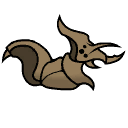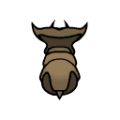Difference between revisions of "Megaspider"
m (additional Infobox data) |
|||
| (25 intermediate revisions by 10 users not shown) | |||
| Line 1: | Line 1: | ||
| − | {{ | + | {{Infobox main|animal |
| name = Megaspider | | name = Megaspider | ||
| − | | image = Megaspider.png | + | | image = Megaspider east.png |
| description = Not actually a spider, the megaspider is a genetically-engineered giant insectoid the size of a bear. Designed for heavy work and combat, its thick chitinous armor makes it hard to kill, while its long ripper-blades make it deadly at close quarters. It is, however, quite slow in open terrain. | | description = Not actually a spider, the megaspider is a genetically-engineered giant insectoid the size of a bear. Designed for heavy work and combat, its thick chitinous armor makes it hard to kill, while its long ripper-blades make it deadly at close quarters. It is, however, quite slow in open terrain. | ||
| type = Animal | | type = Animal | ||
| type2 = Insectoid | | type2 = Insectoid | ||
| − | |||
| − | |||
| − | |||
| − | |||
| − | |||
| − | |||
| flammability = 0.7 | | flammability = 0.7 | ||
| marketvalue = 500 | | marketvalue = 500 | ||
| + | | armorblunt = 0.18 | ||
| + | | armorsharp = 0.27 | ||
| + | | combatPower = 150 | ||
| + | | movespeed = 3.6 | ||
| bodysize = 1.2 | | bodysize = 1.2 | ||
| + | | body = BeetleLikeWithClaw | ||
| healthscale = 2.5 | | healthscale = 2.5 | ||
| hungerrate = 0.35 | | hungerrate = 0.35 | ||
| − | | diet = omnivorous | + | | diet = omnivorous, animal products |
| + | | baseleatheramount = 0 | ||
| wildness = 0.4 | | wildness = 0.4 | ||
| manhuntertame = 0 | | manhuntertame = 0 | ||
| Line 25: | Line 25: | ||
| juvenileage = 0.03 | | juvenileage = 0.03 | ||
| maturityage = 0.2 | | maturityage = 0.2 | ||
| − | | | + | | min comfortable temperature = -40 |
| + | | max comfortable temperature = 60 | ||
| + | | toxic resistance = 1 | ||
| + | | toxic environment resistance = 0.8 | ||
| + | <!-- Melee Combat --> | ||
| + | <!-- 1. Attack --> | ||
| + | | attack1label = head claw | ||
| + | | attack1type = Cut | ||
| attack1dmg = 12 | | attack1dmg = 12 | ||
| − | |||
| attack1cool = 2.6 | | attack1cool = 2.6 | ||
| − | | attack1part = head | + | | attack1part = HeadClaw |
| + | <!-- 2. Attack --> | ||
| + | | attack2label = head | ||
| + | | attack2type = Blunt | ||
| attack2dmg = 7 | | attack2dmg = 7 | ||
| − | |||
| attack2cool = 2 | | attack2cool = 2 | ||
| − | | attack2part = | + | | attack2part = HeadAttackTool |
| + | | attack2ensureLinkedBodyPartsGroupAlwaysUsable = true | ||
| attack2chancefactor = 0.2 | | attack2chancefactor = 0.2 | ||
| + | <!-- Technical --> | ||
| + | | devNote = insect | ||
| + | | defName = Megaspider | ||
| + | | label = megaspider | ||
| + | | tradeTags = AnimalInsect | ||
}} | }} | ||
'''Megaspiders''' are giant, bio-engineered, subterranean invertebrates and the largest and most dangerous of the three [[insectoid]] types. | '''Megaspiders''' are giant, bio-engineered, subterranean invertebrates and the largest and most dangerous of the three [[insectoid]] types. | ||
| Line 43: | Line 57: | ||
{{Insectoid Summary}} | {{Insectoid Summary}} | ||
| − | === | + | === Armor === |
| + | {| class="wikitable" | ||
| + | ! Armor | ||
| + | |- | ||
| + | | {{Apparel Protection Chart|set1name= {{P|Name}} {Sharp) | set1armor1={{P|Armor - Sharp}} | set2name= {{P|Name}} {Blunt) | set2armor1={{P|Armor - Blunt}} }} | ||
| + | |} | ||
| + | == Analysis == | ||
| + | === Combat === | ||
Megaspiders are slightly slower than [[spelopede]]s and [[megascarab]]s. A common feature of any insectoid swarm is for these smaller, less dangerous creatures to glove the megaspiders' approach, absorbing the fire of your colonists and bogging them down until the big hitters are in range. Fully fit humans can outrun even megascarabs, so the strongest tactic is to hit and run, continually falling back in front of the swarm. If they've infested your base, open your doors and try to lead them out into the open. | Megaspiders are slightly slower than [[spelopede]]s and [[megascarab]]s. A common feature of any insectoid swarm is for these smaller, less dangerous creatures to glove the megaspiders' approach, absorbing the fire of your colonists and bogging them down until the big hitters are in range. Fully fit humans can outrun even megascarabs, so the strongest tactic is to hit and run, continually falling back in front of the swarm. If they've infested your base, open your doors and try to lead them out into the open. | ||
| − | Melee | + | [[Melee block]] tactics are very effective, but otherwise you should avoid melee combat. Megaspiders are sturdy and can do a lot of damage very quickly. Do not underestimate how many bullets they take to go down. |
| − | + | == Taming == | |
| + | Wild megaspiders always generate hostile, making them difficult to tame as they will try to attack the animal handler. However, animal interactions during the process will interrupt any attacks. It may be ideal to equip your handler with armor, or to select a handler with a high [[melee]] skill for a higher [[melee dodge chance]] to reduce the risk of harm, though this is not strictly necessary. | ||
| − | + | Megaspiders are practically impossible to tame when they first spawn from an [[infestation]]. In order to try and tame a megaspider, you will need to [[down]] them, then destroy all [[hive]]s from the infestation. With Too Deep: Infestation event and Wastepack Infestations, there are no hives, so all you need to do is down the insect. This ''does not make them non-hostile'', but it will prevent them from seeking out colonists like a raider would. Note that wild megaspiders unlike other animals cannot be operated on and thus can't be anesthetized, and they are prone to waking up and attacking the pawn treating them, Waiting for [[Ailments#Blood loss|blood loss]] to reach extreme can prevent this. | |
| − | + | ||
| − | + | Alternatively, a doctor has a small chance to [[bond]] when tending to a wild megaspider, instantly taming them. | |
| − | + | ||
| − | + | As tamed pets, megaspiders offer few advantages over [[bear]]s, [[cougar]]s/[[panther]]s, or [[elephant]]s. Although the latter are all easier to tame, Megaspiders can be tamed en-masse depending on how many were downed during an infestation, require less training because of their lower wildness, and produce less filth than comparable animals. | |
| − | |||
| − | |||
| − | + | Colonists who go near a hostile megaspider will flee from it by default, so you may need to adjust your handler's [[threat response]] setting, or manually order your handler to interact with it. | |
| − | |||
| − | |||
| − | ==Training== | + | == Training == |
{{TrainingTable}} | {{TrainingTable}} | ||
== Health == | == Health == | ||
| − | {{Animal Health Table}} | + | {{Animal Health Table|BeetleLikeWithClaw}} |
| + | |||
| + | == Gallery == | ||
| + | <gallery> | ||
| + | Megaspider east.png| Megaspider facing east | ||
| + | Megaspider north.png| Megaspider facing north | ||
| + | Megaspider south.png| Megaspider facing south | ||
| + | Dessicated megaspider east.png| Megaspider decaying | ||
| + | </gallery> | ||
== Version history == | == Version history == | ||
* Beta 19/1.0 - All insects main attack cooldowns 2.5 -> 2.9 | * Beta 19/1.0 - All insects main attack cooldowns 2.5 -> 2.9 | ||
* [[Version/1.3.3066|1.3.3066]] - Wildness decreased from 0.95 to 0.40, manhunter on tame chance reduced from 40% to 0. Trainability changed from intermediate to advanced, gestation changed from N/A to 6. | * [[Version/1.3.3066|1.3.3066]] - Wildness decreased from 0.95 to 0.40, manhunter on tame chance reduced from 40% to 0. Trainability changed from intermediate to advanced, gestation changed from N/A to 6. | ||
| − | * [[Biotech DLC]] | + | * [[Version/1.3.3200|1.3.3200]] - Fix: Remove gestation period stat, since they do not breed. |
| + | * [[Biotech DLC]] release - Now gains [[pollution stimulus]] on [[polluted]] terrain. | ||
| − | {{ | + | {{Nav|animal|wide}} |
[[Category:Animals]] | [[Category:Animals]] | ||
[[Category:Insectoid]] | [[Category:Insectoid]] | ||
Latest revision as of 16:40, 31 October 2024
Megaspider
Not actually a spider, the megaspider is a genetically-engineered giant insectoid the size of a bear. Designed for heavy work and combat, its thick chitinous armor makes it hard to kill, while its long ripper-blades make it deadly at close quarters. It is, however, quite slow in open terrain.
Base Stats
Armor
- Armor - Sharp
- 0.27%
- Armor - Blunt
- 0.18%
Pawn Stats
- Combat Power
- 150
- Move Speed
- 3.6 c/s
- Health Scale
- 250% HP
- Body Size
- 1.2
- Mass - Baby
- 14.4 kg
- Mass - Juvenile
- 36 kg
- Mass - Adult
- 72 kg
- Carrying Capacity
- 90 kg
- Filth Rate
- 1
- Hunger Rate
- 0.56 Nutrition/Day
- Diet
- omnivorous, animal products
- Life Expectancy
- 6 years
- Manhunter Chance
- 50%
- Manhunter Chance (Taming)
- 0%
- Trainable Intelligence
- Advanced
- Wildness
- 40%
- Minimum Handling Skill
- 3
- Maturity Age
- 0.2 years (12 days)
- Juvenile Age
- 0.03 years (1.8 days)
- Toxic Resistance
- 100%
- Toxic Environment Resistance
- 80%
- Comfortable Temp Range
- -40 °C – 60 °C (-40 °F – 140 °F)
Production
- Meat Yield
- 168
 Insect meat
Insect meat
Melee Combat
- Attack 1
- Head claw
12 dmg (Cut)
18 % AP
2.6 second cooldown - Attack 2
- Head
7 dmg (Blunt)
10 % AP
2 second cooldown
0.2 chance factor - Average DPS
- 2.52
- defName
- Megaspider
- tradeTags
- AnimalInsect
Megaspiders are giant, bio-engineered, subterranean invertebrates and the largest and most dangerous of the three insectoid types.
Summary[edit]
They are hostile towards any nearby colonists, have plated armor that makes them quite resistant to ranged attack, and can do lethal amounts of damage in close combat. Like all insects, megaspiders only begin spawning in events where colonists come into contact with their underground habitat: In caves, when opening an ancient danger, during an infestation, or by deep drilling.
All insectoids, including the megaspider, experience hypothermic slowdown instead of fatal hypothermia, have 100% Toxic Resistance, rendering them immune to toxic buildup from any source, and 80% Toxic Environment Resistance, rendering them resistant to environmental effects such as rot stink. They experience also pollution stimulus when in polluted terrain.![]() See that page for full details.
See that page for full details.
Insectoids are incapable of sexual reproduction like other animals, due to their breeding type (EusocialInsect). Instead, wild insects reproduce via hives which create new insectoids periodically, up to a maximum value each hive can support. Tamed insectoids cannot reproduce at all. For more detail, see the Hive page.
Armor[edit]
| Armor |
|---|
Analysis[edit]
Combat[edit]
Megaspiders are slightly slower than spelopedes and megascarabs. A common feature of any insectoid swarm is for these smaller, less dangerous creatures to glove the megaspiders' approach, absorbing the fire of your colonists and bogging them down until the big hitters are in range. Fully fit humans can outrun even megascarabs, so the strongest tactic is to hit and run, continually falling back in front of the swarm. If they've infested your base, open your doors and try to lead them out into the open.
Melee block tactics are very effective, but otherwise you should avoid melee combat. Megaspiders are sturdy and can do a lot of damage very quickly. Do not underestimate how many bullets they take to go down.
Taming[edit]
Wild megaspiders always generate hostile, making them difficult to tame as they will try to attack the animal handler. However, animal interactions during the process will interrupt any attacks. It may be ideal to equip your handler with armor, or to select a handler with a high melee skill for a higher melee dodge chance to reduce the risk of harm, though this is not strictly necessary.
Megaspiders are practically impossible to tame when they first spawn from an infestation. In order to try and tame a megaspider, you will need to down them, then destroy all hives from the infestation. With Too Deep: Infestation event and Wastepack Infestations, there are no hives, so all you need to do is down the insect. This does not make them non-hostile, but it will prevent them from seeking out colonists like a raider would. Note that wild megaspiders unlike other animals cannot be operated on and thus can't be anesthetized, and they are prone to waking up and attacking the pawn treating them, Waiting for blood loss to reach extreme can prevent this.
Alternatively, a doctor has a small chance to bond when tending to a wild megaspider, instantly taming them.
As tamed pets, megaspiders offer few advantages over bears, cougars/panthers, or elephants. Although the latter are all easier to tame, Megaspiders can be tamed en-masse depending on how many were downed during an infestation, require less training because of their lower wildness, and produce less filth than comparable animals.
Colonists who go near a hostile megaspider will flee from it by default, so you may need to adjust your handler's threat response setting, or manually order your handler to interact with it.
Training[edit]
This animal can be trained as follows:
| Guard: | |
|---|---|
| Attack: | |
| Rescue: | |
| Haul: | |
*As of version 1.1.2610, all animals can be tamed. The percentage of likelihood of success depends on factors such as the Animals Wildness Percentage, Pawn Handling Skill, and others. More information can be found on the animals page.
Health[edit]
| Part Name | Health | Quantity | Coverage[1] | Target Chance[2] | Subpart of | Internal | Capacity[3] | Effect if Destroyed/Removed |
|---|---|---|---|---|---|---|---|---|
| Shell | 75 | 1 | 100% | 34,0% | N/A[4] | - | - | |
| Elytra | 75 | 2 | 5% | 5,0% | Shell | - | - | |
| Stomach | 50 | 1 | 5% | 5,0% | Shell | Digestion |
−50% Digestion | |
| InsectHeart | 50 | 1 | 3% | 3,0% | Shell | Breathing Blood Pumping Blood Filtration Digestion |
Death | |
| Pronotum | 50 | 1 | 18% | 6,3% | Shell | Eating Talking Breathing |
Death | |
| InsectHead | 75 | 1 | 65% | 1,287% | Pronotum | - | Death | |
| Brain | 25 | 1 | 20% | 2,34% | InsectHead | Consciousness |
Death Damage always results in scarring. | |
| Eye | 25 | 2 | 12% | 1,404% | InsectHead | Sight |
−25% Sight. −100% if both lost. Damage always results in scarring. 0% Hit Chance against Blunt damage. | |
| Antenna | 25 | 2 | 8% | 0,936% | InsectHead | - | - | |
| InsectNostril | 25 | 1 | 6% | 0,702% | InsectHead | - | - | |
| InsectMouth | 25 | 1 | 8% | 0,936% | InsectHead | Eating Manipulation |
−100% Manipulation −90% Eating[5] | |
| HeadClaw | 37.5 | 1 | 15% | 1,755% | InsectHead | - | Can no longer use head claw attack[6] | |
| InsectLeg | 50 | 6 | 6% | 6,0% | Shell | Manipulation Moving |
−16.7% Moving[7] |
- ↑ Coverage determines the chance to hit this body part. It refers to the percentage of the super-part that this part covers, before its own sub-parts claim their own percentage. For example, if the base coverage of the super-part is 100%, and the coverage of the part is 20%, 20% of hits would hit the part, and 80% the super-part. If the part had its own sub-part with 50% coverage, the chances would be 10% sub-part, 10% part, 80% super part.
- ↑ Target Chance is the actual chance for each part to be be selected as the target when each part's coverage has been taken into account(I.E. Neck covers 7.5% of Torso but Head covers 80% of Neck so it actually has only a 1.5% chance to be selected). This is not pure hit chance, as different damage types propagate damage in different ways. See that page for details.
- ↑ Note that capacities can affect other capacities in turn. Only the primary effect is listed. See specific pages for details.
- ↑ This is the part that everything else connects to to be considered 'connected'.
- ↑ Note that eating won't go below 10%. See specific pages for details.
- ↑ Cut attack of power 12, cooldown 2.6s
- ↑ If Moving drops below 16% a pawn cannot move.
Gallery[edit]
Version history[edit]
- Beta 19/1.0 - All insects main attack cooldowns 2.5 -> 2.9
- 1.3.3066 - Wildness decreased from 0.95 to 0.40, manhunter on tame chance reduced from 40% to 0. Trainability changed from intermediate to advanced, gestation changed from N/A to 6.
- 1.3.3200 - Fix: Remove gestation period stat, since they do not breed.
- Biotech DLC release - Now gains pollution stimulus on polluted terrain.




